- About Ramapo
- Academics
- Admissions & Aid
- Student Life
- Athletics
- Alumni
- Arts & Community
- Quick Links
- Apply
- Visit
- Give
News / Events
February 28, 2025Congratulations to Hannah Steinlauf!
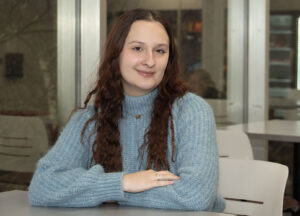
Hannah Steinlauf (’25)
Congratulations to third year senior Hannah Steinlauf (’25) with a major in History and a minor in Museum and Exhibition Studies who has just committed to Trinity College Dublin for a master’s in Public History and Cultural Heritage. While choosing between multiple graduate acceptances, Hannah picked Trinity because it gave her the opportunity to focus on museum accessibility in the very country she studied abroad in in Fall 2023. Her undergraduate internship with Wayne Museum and work with the Jane Addams Papers Project has inspired her passion for the importance of the digital humanities and making history and museums accessible, which she intends to pursue in her postgraduate studies.
February 27, 2025Congratulations to Elly Raisch!
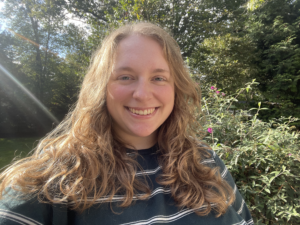
Elly Raisch (’25)
Congratulations to Senior International Studies major Elly Raisch (‘25) who was accepted to Simmons University’s graduate program for Library and Information Science. Elly initially became interested in library work through her experiences working at Ramapo’s Center for Reading and Writing and the Digital Humanities Center’s Penny Colman Project. These opportunities helped foster her passion for service and information organization, leading her to pursue a path towards public librarianship in the hopes of supporting free access to media and public resources.
November 12, 2024Sarah Koenig Presents on Wild West in New Jersey at the Mahwah Museum
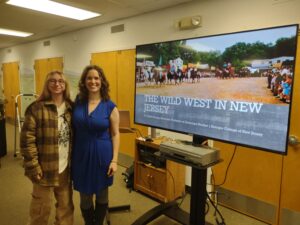
Sarah Koenig and Maddisyn Vaccaro at the Museum, November 10, 2024.
American Studies Professor Sarah Koenig presented student work in her American West course to an audience at the Mahwah Museum. Accompanied by Ramapo senior Maddisyn Vaccaro. Dr. Koenig’s talk, The Wild West in New Jersey, looks at the Garden State’s contribution to both the development of the West (Stetson hats, the Paterson Colt Revolver) and to the myth of the West (Thomas Edison’s early films). Maddisyn discussed her research for the class of a film studio that made Westerns in New Jersey’s Pine Barrens, explaining how she had to dig deep into historical resources to document it.
November 4, 2024Ramapo Students Attend Northwest Bergen History Coalition Luncheon
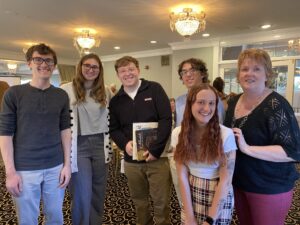
Christopher Flug, Michelle Kukan, Alexander Samieske, Alan Rosenberg, Hannah Steinlauf and Cathy Hajo at the luncheon.
The Northwest Bergen History Coalition is an organization of twelve local history museums that work together to promote local history research. Many of its members offer internships to Ramapo College students. The coalition hosted five students at its recent luncheon on November 1. Christopher Flug (American Studies major), Michelle Kukan, Alexander Samieske, Alan Rosenberg, and Hannah Steinlauf (all History majors) helped with registration and book sales.
Speakers included Cynthia Forster of the Bergen County Division of Cultural and Historical Affairs discuss plans for Bergen 250, an initiative to celebrate the upcoming anniversary of the American Revolution and provide information on opportunities for volunteer work and internships. The main speaker at the luncheon was Jim Wright, a local historian and journalist. He spoke on The Turncoat and the Patriot, an exploration of John Fell and William Franklin’s different paths during the Revolution. All attendees received a copy of Wright’s children’s book, The Ghosts of Allendale.
October 8, 2024Critical Reading & Writing SI Sections
Critical Reading and Writing offers sections of CRWT 102 with supplemental instruction for students who tested into CRWT 101S. “Supplemental instruction” refers to an internationally recognized set of teaching practices aimed at strengthening undergraduate students’ reading, writing, and research skills.
If you tested into 101S, please register for 102S to continue to receive the instructional support the college has provided to support your continued success at Ramapo.
For more information contact success@ramapo.edu or hgs@ramapo.edu
May 3, 2024Dean Chen's Quick Take on US-Korea-China-Taiwan Relations
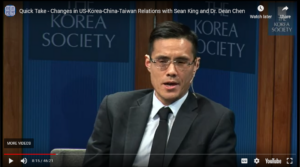 Professor of Political Science Dean Chen participated in a talk along with Sean King on May 2 at the Korea Society, discussing Given heightened tensions and strategic competition in the Indo Pacific, how is South Korea navigating its diplomatic, economic, and security relationships with the US, China, and Taiwan? In a 2023 Joint Statement, US President Joseph Biden and South Korean President Yoon Suk Yeol “reiterated the importance of preserving peace and stability in the Taiwan Strait [and] strongly opposed any unilateral attempts to change the status quo in the Indo-Pacific…” thereby underscoring an uptick in Korean interest and attention to the Taiwan question.
Professor of Political Science Dean Chen participated in a talk along with Sean King on May 2 at the Korea Society, discussing Given heightened tensions and strategic competition in the Indo Pacific, how is South Korea navigating its diplomatic, economic, and security relationships with the US, China, and Taiwan? In a 2023 Joint Statement, US President Joseph Biden and South Korean President Yoon Suk Yeol “reiterated the importance of preserving peace and stability in the Taiwan Strait [and] strongly opposed any unilateral attempts to change the status quo in the Indo-Pacific…” thereby underscoring an uptick in Korean interest and attention to the Taiwan question.
Watch the fascinating discussion here!
April 30, 2024Japanese Language and Culture Study Awards go to Three RCNJ Students!
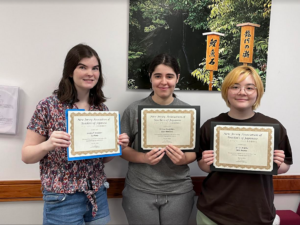
CJ Fisher, Emily Markuske and Gene Anerine with their awards.
Congratulations to Gene Anerine, CJ Fisher, and Emily Markuske, three students who studied with Ramapo Adjunct Professor of Japanese Kei Sakayama. The students, who tool Japanese Foundation II were recently honored with 2024 NJATJ Japanese Language and Culture Study Awards. These awards are presented by the New Jersey Association of Teachers of Japanese, which recognizes selected students from New Jersey high schools and colleges for their achievements, efforts and interests in learning the Japanese language and culture.
March 25, 2024Miranda Trautmann Featured Tonight in National Showcase on Sharing Stories from 1977
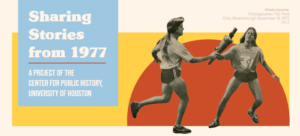 Professor Stacie Taranto reports that history major Miranda Trautmann will be participating in a national showcase for work she did in a digital history project last semester. The Sharing Stories from 1977 project will host its first annual student showcase on Monday March 25, 7-8 pm central online. Miranda is one of seventeen students selected to show their work which features biographical research done on members of the 1977 National Women’s Conference. This nationwide project seeks to uncover the stories of all 2,000 participants in the Conference in time for its fiftieth anniversary in 2027.
Professor Stacie Taranto reports that history major Miranda Trautmann will be participating in a national showcase for work she did in a digital history project last semester. The Sharing Stories from 1977 project will host its first annual student showcase on Monday March 25, 7-8 pm central online. Miranda is one of seventeen students selected to show their work which features biographical research done on members of the 1977 National Women’s Conference. This nationwide project seeks to uncover the stories of all 2,000 participants in the Conference in time for its fiftieth anniversary in 2027.
You can watch via Zoom by registering here: https://www.eventbrite.com/e/sharing-stories-student-showcase-tickets-848447087077
March 14, 2024Professor Taranto's Students Participate in Sharing Stories Database
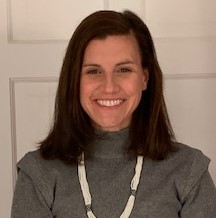 In the fall semester of 2023, Professor Stacie Taranto’s HIST 316-01 course, “A History of Women in American Politics,” took part in a large, NEH-funded digital history project — the Sharing Stories from 1977 database — that will result in all 15 students in the class becoming published authors on the site. Sharing Stories is a growing digital history project run out of the University of Houston that is advised by prominent scholars in U.S. women’s history and relates directly to the course’s theme of women in American politics. The site captures the history of the National Women’s Conference. In November 1977, America held a taxpayer-funded National Women’s Conference (NWC) in Houston, Texas – the country’s first (and so far, only) taxpayer-funded national conference on women. The idea for the national conference sprang from a United Nations’ initiative in 1975. The idea was for each UN member nation, including the United States, to host a national conference to assess the state of women’s rights in that country — and to put together an agenda (with policy recommendations) for lawmakers that would make women equal to men in that country (socially, politically, legally, etc.) Before America’s national conference, there were a series of meetings held in each American territory and state – including New Jersey – to select 2,200 delegates (including 39 delegates and 1 alternate from NJ) to attend the national conference in Houston, and to begin coming up with policy ideas for American lawmakers (on every level) that would make women more equal to men.
In the fall semester of 2023, Professor Stacie Taranto’s HIST 316-01 course, “A History of Women in American Politics,” took part in a large, NEH-funded digital history project — the Sharing Stories from 1977 database — that will result in all 15 students in the class becoming published authors on the site. Sharing Stories is a growing digital history project run out of the University of Houston that is advised by prominent scholars in U.S. women’s history and relates directly to the course’s theme of women in American politics. The site captures the history of the National Women’s Conference. In November 1977, America held a taxpayer-funded National Women’s Conference (NWC) in Houston, Texas – the country’s first (and so far, only) taxpayer-funded national conference on women. The idea for the national conference sprang from a United Nations’ initiative in 1975. The idea was for each UN member nation, including the United States, to host a national conference to assess the state of women’s rights in that country — and to put together an agenda (with policy recommendations) for lawmakers that would make women equal to men in that country (socially, politically, legally, etc.) Before America’s national conference, there were a series of meetings held in each American territory and state – including New Jersey – to select 2,200 delegates (including 39 delegates and 1 alternate from NJ) to attend the national conference in Houston, and to begin coming up with policy ideas for American lawmakers (on every level) that would make women more equal to men.
Before the 50th anniversary of the National Women’s Conference in 2027, Sharing Stories is hoping to write biographies of all 2,200 delegates who attended the conference in 1977. Here are some sample biographies from other states. Before last semester, no biographies had been written about the 39 NJ delegates and 1 alternate. Professor Taranto’s 15 students each took a delegate to research, working alongside students from other colleges/universities in New Jersey (Monmouth University, Rowan University, Union County Community College, and The College of New Jersey). Thanks to their efforts, biographies have now been written of the 39 NJ delegates and 1 alternate delegate who attended the NWC in 1977.
The students in HIST 316 were given direction each week on what public sites to research their delegates on, and every week, the class wrote up summaries of what they learned (for Professor Taranto ‘s feedback) as well as talked about the process at the beginning of class, so they could learn from each other — as historians do at conferences. They were also in touch (if they wanted) with the other students in NJ working on delegates from NJ (as some of their delegates had been friends, so a Ramapo student might in the process of researching their delegate, stumble upon information about a delegate someone from TCNJ was researching). The students engaged in deep historical research, working with librarians at Ramapo College and the Mahwah Public Library, as well as their professor, to access sites such as Newspapers.com (professor’s subscription), Access World New (Potter Library), Proquest Newspapers (Potter Library), Heritage Quest (Mahwah Library), and much more. Through this process, some students got in touch with their delegates (or their family members) to learn about their political journeys in the 1970s. One student’s delegate even ended up joining the class via WebEx for the final class meeting to talk about her life, which drove home several political themes, especially about the growth of modern feminism, that the course covered. Students reported that this project really brought history to life for them — the goal of every history course!
In the end, each HIST 316 student wrote 500-word biographies of their delegates (going through multiple drafts with feedback from their professor and classmates) that are currently being fact-checked and edited at Sharing Stories for publication on the site in late summer /early fall 2024. One student in the class, Miranda Trautmann, will participate in a national forum (over Zoom) on March 25, 2024, with students from across the country who also researched delegates for Sharing Stories in their history classes, including students from the following institutions: Brown University (RI), Colby College (ME), DePauw University (IN), Idaho State University, Illinois State University, Merrimack College (MA), Rowan University (NJ), Sacred Heart Preparatory High School (CA), Saint Mary’s College (IN), Union College of Union County, NJ, University of Alabama at Birmingham, and the University of Houston (TX).
As a result of this fantastic experience, students in HIST 316 will not only become published authors, but they engaged in deep research of a historical subject, made connections with other history students across the nation and state, and learned about historical writing and editing.
Professor Taranto recently joined the national editorial board of Sharing Stories, where she will supervise 2 graduate students working on PhD’s in American history, as they edit and and fact-check delegate biographies produced by undergraduates (like her own in HIST 316) from across the country — prepping the biographies for publication on the site. Professor Taranto will draw on her experience as an associate editor at another major digital history project — Made by History at Time Magazine — to supervise this editorial process.
February 5, 2024Starr Vijolan-Bobelea Interns in Washington, DC
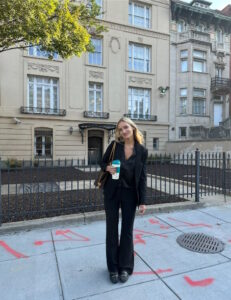
Starr Vijolan-Bobelea in Washington in Fall 2023.
Starr Vijolan-Bobelea, a fourth-year student majoring in Political Science, spent fall of 2023 in Washington DC with Ramapo’s DC internship program. We asked her a few questions about her experience:
Why did you decide to do a DC internship instead of one closer to home? I chose to pursue an internship in Washington, DC to participate in a type of study abroad program that is not as far as other forms of study abroad programs. In addition, as a political science major pursuing a future in the legal field, I was very intrigued to work in a public interest law firm. In the future, I would like to pursue a career in New York City, but for the time being, I wanted to get a sense of the work culture in our nation’s capital.
What were some of the challenges you faced in your internship? Adjusting to the distance from home was the biggest challenge I faced. Being my first time away from home, it took some getting used to being away from my family. However, this experience definitely gave me a sense of independence.
What did you do in DC outside of the classes and internships? Outside of classes and my internship obligations, I attended numerous networking events and explored many of DC’s museums.
Would you recommend this for other Ramapo students? I would definitely recommend this program to other Ramapo students, regardless of their field of study. I believe that there is something for everyone in Washington, DC, and it is a beautiful, productive city to gain working experience.
Ramapo’s Washington DC internship program is not just for political science majors. If you or are your students are interested in contact Prof. Jeremy Teigen (B211) or check out www.wiidc.org/ramapo

Copyright ©2025 Ramapo College Of New Jersey. Statements And Policies. Contact Webmaster.

Follow Ramapo